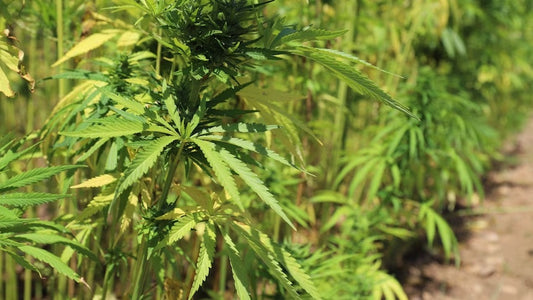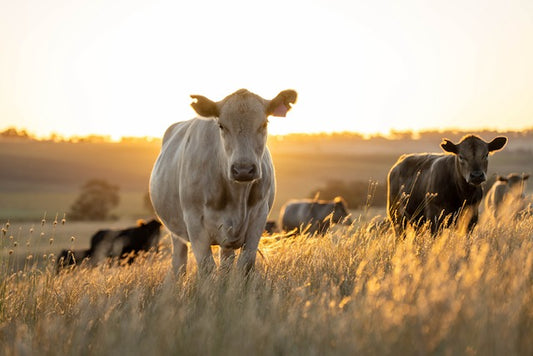Cattle and marron are being fed hemp-based pellets on a farm on WA's south coast, in a trial that aims to improve their health and meat quality.
Hemp is a variety of cannabis, which is safe to grow and consume under licence due to its low THC and cannabinoid content.
Raintree Estate is home to a licensed hemp crop, used mainly to produce a hemp spirit for gin and vodka, and the by-product from the distilling process is being used in the pellets. The independent study involves feeding the hemp pellets to nine Angus-Wagyu cross cattle, with the control herd eating other pasture fodder.

"Based on the quality of the plant with the omegas, and the essential fatty acids as well as the protein we should, over time feeding this back to animals, see an increase in beneficial omegas," Raintree's co-director Chelsea Beaton said.
"In the animal we're hoping to see decrease cholesterol but also for humans, and in human consumption, we're looking to produce a meat product that is healthier than anything else on the shelf."
She said she hoped to see an improvement for animal health, human health, and the planet.
"I'm really, really interested in how it's going to change the meat quality and composition, and the impact it will have on overall animal health, but also human health."
As a veterinarian Ms Beaton was comfortable with undertaking these trials.
"I'm not going to do anything that's going to put animal health in jeopardy, and what we don't want to see is animals going under trial and coming out stoned."
She said they were closely monitoring the animal's health, while working with regulatory bodies and legislation in Australia to ensure they were adhering to all the policies.
"One of the things we are checking is that there's no transfer of any of the THC or CBD constituents … coming over into the meat."

Complying with regulation
Ms Beaton's father, Steven Birkbeck who also operates the farm, said they had to comply with all industry standards.
He said if any trace of THC was found in the meat, it could not be consumed.
"There's nothing stopping you doing research, but you're not allowed to sell meat with contamination, and it's upon yourself to make sure … you do these tests," Mr Birkbeck said.
"We need to sell the meat and comply with the Australian food standard, so, we're not exporting the product."
Raintree estate also has an on-farm restaurant, where they use produce from the farm in the kitchen.
"We're keeping complete control of the supply chain, we have our own restaurant, and this allows us to work within the WA hemp act and meat livestock guidelines, but we must meet Australian New Zealand food standards."
Developing hemp as stockfeed
In WA's South West, another hemp producer, Harvey Hemp, has developed hemp meal high in protein and omega fatty acids for horse feed.
This product, along with hemp oil for other animals, is commercially available.
The state government's own research arm, the Department of Primary Industires and Regional Development is carrying out trials using hemp to feed sheep.
The project hopes to make hemp a more attractive feed option for Australian farmers, and help develop regulations for using hemp as a forage crop.
Industrial hemp is currently not allowed to be used as a livestock forage in Australia due to concerns that THC could transfer from animal products to people.
The Australian hemp industry has grown substantially in recent years, with projections of a "booming" future.


